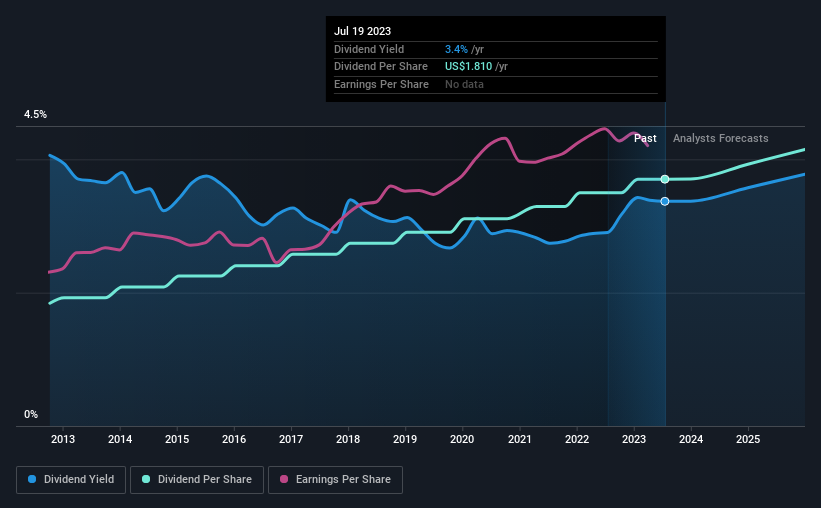- United States
- /
- Electric Utilities
- /
- NasdaqGS:LNT
Alliant Energy (NASDAQ:LNT) Has Announced That It Will Be Increasing Its Dividend To $0.4525

Alliant Energy Corporation (NASDAQ:LNT) has announced that it will be increasing its dividend from last year's comparable payment on the 15th of August to $0.4525. Although the dividend is now higher, the yield is only 3.4%, which is below the industry average.
See our latest analysis for Alliant Energy
Alliant Energy's Earnings Easily Cover The Distributions
While yield is important, another factor to consider about a company's dividend is whether the current payout levels are feasible. Before making this announcement, Alliant Energy was earning enough to cover the dividend, but it wasn't generating any free cash flows. In general, we consider cash flow to be more important than earnings, so we would be cautious about relying on the sustainability of this dividend.
Over the next year, EPS is forecast to expand by 27.1%. If the dividend continues along recent trends, we estimate the payout ratio will be 57%, which is in the range that makes us comfortable with the sustainability of the dividend.

Alliant Energy Has A Solid Track Record
The company has a sustained record of paying dividends with very little fluctuation. Since 2013, the annual payment back then was $0.90, compared to the most recent full-year payment of $1.81. This works out to be a compound annual growth rate (CAGR) of approximately 7.2% a year over that time. The dividend has been growing very nicely for a number of years, and has given its shareholders some nice income in their portfolios.
Alliant Energy May Find It Hard To Grow The Dividend
Some investors will be chomping at the bit to buy some of the company's stock based on its dividend history. Earnings have grown at around 4.8% a year for the past five years, which isn't massive but still better than seeing them shrink. The company has been growing at a pretty soft 4.8% per annum, and is paying out quite a lot of its earnings to shareholders. This isn't bad in itself, but unless earnings growth pick up we wouldn't expect dividends to grow either.
In Summary
Overall, we always like to see the dividend being raised, but we don't think Alliant Energy will make a great income stock. While Alliant Energy is earning enough to cover the payments, the cash flows are lacking. We would be a touch cautious of relying on this stock primarily for the dividend income.
Market movements attest to how highly valued a consistent dividend policy is compared to one which is more unpredictable. Still, investors need to consider a host of other factors, apart from dividend payments, when analysing a company. Just as an example, we've come across 2 warning signs for Alliant Energy you should be aware of, and 1 of them can't be ignored. If you are a dividend investor, you might also want to look at our curated list of high yield dividend stocks.
New: Manage All Your Stock Portfolios in One Place
We've created the ultimate portfolio companion for stock investors, and it's free.
• Connect an unlimited number of Portfolios and see your total in one currency
• Be alerted to new Warning Signs or Risks via email or mobile
• Track the Fair Value of your stocks
Have feedback on this article? Concerned about the content? Get in touch with us directly. Alternatively, email editorial-team (at) simplywallst.com.
This article by Simply Wall St is general in nature. We provide commentary based on historical data and analyst forecasts only using an unbiased methodology and our articles are not intended to be financial advice. It does not constitute a recommendation to buy or sell any stock, and does not take account of your objectives, or your financial situation. We aim to bring you long-term focused analysis driven by fundamental data. Note that our analysis may not factor in the latest price-sensitive company announcements or qualitative material. Simply Wall St has no position in any stocks mentioned.
About NasdaqGS:LNT
Alliant Energy
Operates as a utility holding company that provides regulated electricity and natural gas services in the United States.
Average dividend payer with questionable track record.


